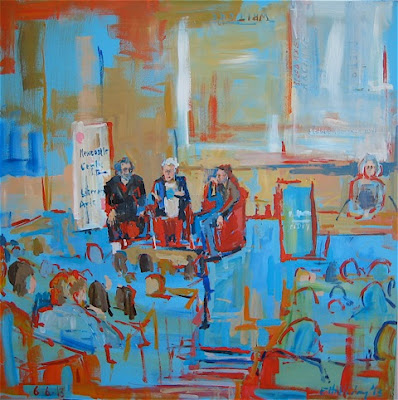On 21st May, NCLA were delighted to welcome the poets Deryn Rees-Jones and Julia Copus, whose most recent collections graced last year’s T.S. Eliot Prize shortlist. Their highly anticipated reading affirmed to the audience – if we needed reminding – just what poetry can do. Previous collections by Deryn Rees-Jones have been shortlisted for the Forward Prize, won a Cholmondeley Award and received a Poetry Book Society Special Commendation. A respected critic and editor, she is also Professor of Poetry at the University of Liverpool.
Rees-Jones read from Burying the Wren, a collection that explores renewal and loss. Many of the poems can be read as elegies to her late husband, the poet and critic Michael Murphy, who died in 2009. They also examine how loss forces us re-evaluate the self to find its new place in a fractured world. The poems are also full of sensual delights: of food and the body in Truffles, which are,
‘More pungent then, than mountain goats
whose cheese we daub on rounds of bread,
the amoretti which we dip in wine
and where lovers ‘root out treasures’ for themselves.'
As we discovered, Rees-Jones is unafraid to challenge her audience. The remarkable – and at times unnerving – Dogwoman re-imagines the self in canine disguise. The sequence is based on the Dogwoman paintings of Paula Rego, where bestial, snarling women bay after an absent man. But the Dogwoman in these poems is not reduced to canine submission, but rather affirms her animal response to loss. She insists on the raw physicality of grief through driving insistence and repetition:
‘Dog tricks and the memory of dogs, dogs dreaming
and not in colour. Dog fetching, dog on a leash,
dog watching, dog weeps. Dog fond, dog mother
Dog sniff. Dog holler. God of dogs, dog love.
Dog sent to bed in deep disgrace. Dog shock, piss, squalor.
And joy, dearest, tail wag. Dog rhythm, dog riff,
dog's domain and death's dominion.
The body's frame's not enough for itself,
these pale fires of horror.’
There were also poems that delighted in love’s mystery, as in A Chinese Lacquered Egg where:
‘Something is beginning. We feel it in the raw edges
of our dreams, our bodies hostage to light, to weather…’
‘…Between breath and silence it is showing itself.
In these shortened nights it is not unlike rapture,
an unworded prayer its indelible hum.’
She finished her reading with a coda from the title poem, Burying the Wren. It is a call to life beyond grief,
‘… sending you in the longboat of your body
where worlds and words collide, was not
the end of love. Yet love
you’ve been with me enough,
so I must let you be, remove myself from the
cool earth…’
There could be few in the audience who did not respond to Rees-Jones’ bravura reading – a testament the power of both the lyric poem and the spoken word.
Julia Copus is a previous winner of both an Eric Gregory award and the Forward Prize. The audience warmed to her arresting reading from The World’s Two Smallest Humans. These are poems that reflect the personal: the end of love, loss, childhood and memory, universal themes she develops with great skill and an individual vision. Many of the poems explore different possible outcomes at pivotal moments of our lives. She began with This is the Poem in which I Have Not Left You, which reconfigures the decision to end a love affair through a series of negative assertions, e.g. I do not turn…I dare not speak…we do not part. It takes the reader back to a point where choices must be made, yet the poem’s conclusion undercuts any suggestion of uncertainty or regret:
‘...Then further off, after the rain is done
the voice of the redstart calling do it, do it!,
calling from the smallest tree in the garden.’
Copus is sometimes credited with popularising the specula (mirror) form, where two halves of the poem function as a mirror image of each other. The differently punctuated lines in the second stanza of a poem become an exact reflection of the first. This extraordinary formal control allows her to imagine events simultaneously taking place in the both the past and present. She uses the form masterfully in Raymond at 60, which concertinas both grief and childhood memory – linking both with the central character's obsession with London bus routes! Copus finished with a poem from Ghost, a sequence examining the distress of infertility and the difficulties of IVF treatment. Again, she explored possible outcomes in the final poem Pledge, a sea-sibilant lullaby addressed to a child ‘in the deeps of the future’:
‘…I give myself over, shell and shelter,
child, my own. By and by with the push of the wash
I’ll usher you in.’
Like Rees-Jones, Copus finished a fine reading on an optimistic note. It was a remarkable evening that will long be remembered by their appreciative NCLA audience.























